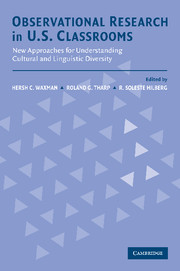 Observational Research in U.S. Classrooms
Observational Research in U.S. Classrooms Published online by Cambridge University Press: 23 November 2009
As the number of states and local school districts requiring high-stakes testing grows, controversy intensifies around the issue of the impact of such testing on the quality of instruction and on the education of the students who ostensibly are its intended beneficiaries (National Research Council, 1999; Sadowski, 2000). Many parents, students, and educators express concerns about the emphasis on improving the passing rates on high-stakes tests (Rose & Gallup, 2000; Schrag, 2000). They fear that such a focus militates against good instruction and tends to reduce the scope of the curriculum to that which is tested. Implicit in these concerns is the assumption that getting good results on the tests requires repetitive drill and practice on isolated skills and content to the exclusion of what might be termed teaching for meaning. These concerns also assume that teaching for meaning will result in poorer performance on the tests.
Particularly troubling is the effect on those students who experience difficulty with learning, live in high-poverty conditions, and represent a diversity of cultural and linguistic backgrounds. Educators use various terms to describe these students (at risk, educationally disadvantaged, marginal, etc.) to capture the disconnection between students and the conditions designed for their learning. Typically, although attention may be directed to their needs, little effort has been expended to identify and build on the assets that they bring with them from their diverse backgrounds (Levin, 1987).
To save this book to your Kindle, first ensure [email protected] is added to your Approved Personal Document E-mail List under your Personal Document Settings on the Manage Your Content and Devices page of your Amazon account. Then enter the ‘name’ part of your Kindle email address below. Find out more about saving to your Kindle.
Note you can select to save to either the @free.kindle.com or @kindle.com variations. ‘@free.kindle.com’ emails are free but can only be saved to your device when it is connected to wi-fi. ‘@kindle.com’ emails can be delivered even when you are not connected to wi-fi, but note that service fees apply.
Find out more about the Kindle Personal Document Service.
To save content items to your account, please confirm that you agree to abide by our usage policies. If this is the first time you use this feature, you will be asked to authorise Cambridge Core to connect with your account. Find out more about saving content to Dropbox.
To save content items to your account, please confirm that you agree to abide by our usage policies. If this is the first time you use this feature, you will be asked to authorise Cambridge Core to connect with your account. Find out more about saving content to Google Drive.